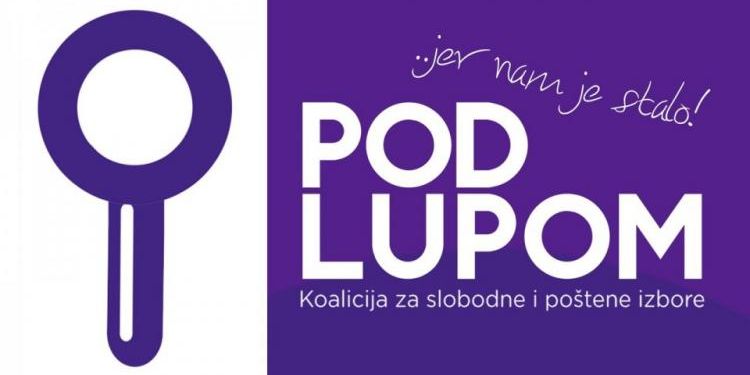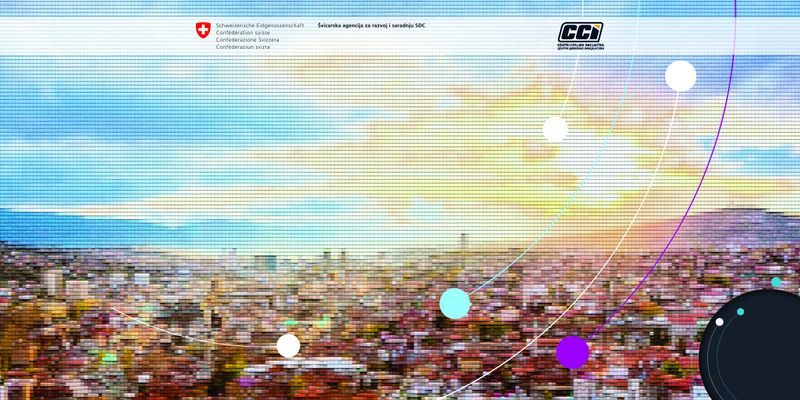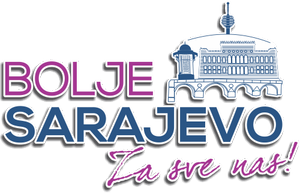
Successful CCI’s campaign in Bijeljina was aimed at resolving the problem of insufficient capacity of Bijeljina kindergartens. There is only one kindergarten in the town which is partly financed by the municipal budget. The purpose of the campaign was to make sure that private kindergartens, the founder of which is not the municipality, are subsidized from the municipal budget. After conducted campaign the municipality included the funds for subsidizing the private kindergartens in the budget for 2011. By this the children who stay in private kindergartens were brought in the equal position with the children who are lucky enough to have a place in the public kindergarten. These activities were carried out as part of the project Local Government for Better Quality of Citizens’ Life, financially supported by the delegation of BH European Commission and the Open Society Fund.
In October 2010, within the Project Local Government for the Quality of Citizens’ Life, the Centres for Civic Initiatives, together with the Parents’ Council for Bijeljina Kindergartens, started the campaign “We Want to Go to Kindergarten Too”. The campaign aimed at solving the problem of insufficient capacity of the public kindergarten. In a survey conducted in order to collect data for reports on quality of life in BH municipalities, it was found that there was only one public kindergarten in Municipality Bijeljina, with the capacity for 370 children, which, compared to other cities in BiH, and considering the number of population is far from sufficient. Besides this, there are three private kindergartens that charge much more for their services, given the fact that the public kindergarten is partly financed from the municipal budget. Many parents, whose children were not accepted in the public kindergarten due to the lack of capacity, and who could not afford to send their children to private kindergartens, decided not to send they children to kindergarten at all. So, these children were brought in an unequal position compared to those children who had an opportunity to go to the kindergarten.
A solution to this problem, according to the Parents’ Council and the CCI was in allocations from the municipal budget that should provide subsidies for staying of the children in kindergartens not founded by the Municipality. This would mean that the conditions of children’s staying in private pre-school institutions would be brought to approximately the same level as those in the public kindergarten. The campaign started with sending an initiative to the responsible local governance bodies. This initiative requested that the municipal decision from the year 2008 when private kindergartens were allocated 50-80 KM per child, as a subsidy, would be restored. According to this initiative, an item of subsidizing staying of children in private kindergartens should be incorporated again in the draft budget for 2011.
The campaign used different instruments for securing support to this idea, on the part of broader community. Characteristic billboards erected in the town of Bijeljina soon attracted the public’s attention, first of all of the media and citizens, and subsequently resulted in a number of newspaper articles on this subject, as well as radio and TV shows. Parents’ Council and CCI also organized a petition by which more than 2000 signatures of Bijeljina citizens were collected as a sign of support. The stand organized in the center of town was an opportunity not only for collecting signatures but also for public gathering of the parents, children and other citizens, who spoke publicly about this problem that they were faced with. In addition to the petition and public gathering, a number of meetings were organized between local administration and representatives of the Parents’ Council and CCI, in order to find an appropriate solution. According to the preliminary standpoint of the local government this approach to solving the problem of accommodation of children in pre-school institutions was not an appropriate one; they rather suggested that a new public kindergarten be built. However, the arguments that the Parents’ Council and the CCI used could not have been easily beaten, so that the mayor of Bijeljina, Mico Micic, in the public meeting held in November 2010, promised to solve this problem together with pre-school institutions and representatives of parents.
The campaign was successfully completed in December 2010, when the local authorities decided that the funds in the amount of 100 000 KM would be allocated from the budget for subsidizing staying of children in private kindergartens. Currently, a rulebook is being developed, which will lay down the model of equitable distribution of allocated funds.
CCI successfully completed the implementation of a three-year project ''Civil Society and Citizens''. Through realization of 18 major advocacy campaigns aiming at solving concrete problems of BiH citizens, the project Civil Society and Citizens made a concrete contributions to the establishment of a democratic society in BiH, by building capacities and practice of civil society organizations to represent the interests of citizens in a more effective manner. The project was implemented with the financial support of the Embassy of the Kingdom of the Netherlands in BiH.
Project implementation period was marked by a political crisis, which gradually grew into a permanent state of BIH political scene as well as by economic and social crisis. Nevertheless, the defined project objectives were achieved. The project consisted of three major components: grants – through which other NGOs projects were supported; campaigns – conducted by the CCI and concerned the field of education, ecology and policy of sustainability of civil society organizations in BIH; advocacy fund – through which the first independent BIH fund to support the advocacy activities of NGOs was established.
As a part of the grant component, the best 13 projects were supported and half a million Euro was allocated for them and the following results were achieved:
- The percentage of protected natural territory increased from 1% to 2,5%;
- The public institution Archeological and Natural Park – Municipality of Srbac was established;
- Basic package of health care in FBiH was adopted;
- Adult Education Act in RS was adopted;
- Law on Guarantee Fund of the RS – as an essential measure of youth self-employment – was adopted;
- Law on FBiH Youth was adopted;
- The basic package of health services or rights for all beneficiaries of the compulsory health insurance was adopted;
- Law on Rights, Duties and Responsibilities of Patients in FBiH was adopted;
- New by-law measures to ensure more equal treatment of private sector in the process of negotiating health protection for insured persons was adopted in both entities;
- Enrollment in universities in BiH increased to about 30%;
- The capacities of grant beneficiaries were enhanced through 7 specialized trainings in the fields of public advocacy, financial management, public relations, risk management, project management, and tax policy.
As a part of the Campaign component, the following results were achieved:
- Primary Education Act was adopted in the Bosnian Podrinje Canton allowing parents to choose school principals;
- A study on justifiability and feasibility of the introduction of compulsory secondary education in BiH was prepared;
- Sarajevo Canton adopted the law on the introduction of two years of compulsory secondary education ;
- Growth of the number of scholarships and the budget allocations for scholarships was noted in 2008 and 2009;
- Regulation on Packaging Waste in FBiH was adopted;
- An analysis and proposal of amendments of the package of legislation to improve the environment for work of NGOs, especially in financial terms, were prepared.
As a part of the Advocacy Fund component, the following key results were achieved:
- Advocacy Fund was established and the Fund action strategy was defined for the period 2009 – 2014;
- Financial means for the work of the Fund in the amount of 50,000.00 KM were ensured;
- Public invitation was announced and three grants were awarded to NGOs in BiH.
The Project Civil Society and Citizens significantly contributed towards strengthening of democracy in BiH. The achieved results and indicators ensured a high level of certainty that the project improved the BH civil society image, through realization of 18 advocacy campaigns aimed at solving concrete problems of citizens. The project also proved to have improved the prospects for local financial sustainability of the civil sector in BiH through interventions in fiscal laws and establishment of the first independent fund to support public advocacy activities by non-governmental organizations. It also contributed to bringing the legal framework in BiH closer to the EU standards by advocating the adoption of measures, policies and laws in education, health care and environmental protection.


Responsibility Forums were held in those municipalities where CCI implemented the project Local Government for a better quality of life Forums were held after the publication of reports on the quality of life of citizens. Conceived as a public meeting at which government representatives present achieved vs. planned activities and answer the citizens’ questions, responsibility forums were designed to increase citizens' knowledge about work i.e. lack of work of local government, to bring closer the key persons of local administration to the citizens, thus making their work more transparent. These activities are supported by the European Commission Delegation in BiH as well as by the BH Open Society Fund.
The first in a series of responsibility forums was held in the municipality of Novo Sarajevo, where the mayor Nedžad Koldžo with his closest associates presented to about one hundred people the degree of implementation of the plans for the year 2010, as well as the plans of local administration for the year 2011. "Primarily by infrastructure development, and complete coverage of water supply and sewage network the municipality of Novo Sarajevo is among the first, if not the first, in Bosnia and Herzegovina, which allocates most funds to help pensioners, for scholarships for full-time pupils and students, the most successful athletes and children without both parents," said Koldžo. In spite of the fact that the planned time for the Forum was 90 minutes, because of many questions asked by the public, with the consent of all participants, the Forum was extended by an hour in order to answer all the questions of the citizens. Most questions referred to the lack of parking spaces and sports facilities, position and funding of NGOs, infrastructure projects in the field of road, water and sewage networks, excursion site Park Šuma Hum, and scholarships for pupils and students. "I am glad that such a gathering organized by the CCI is happening in Novo Sarajevo town hall, that I am talking to the citizens, although I am very present in the field, because only by talking to people one can get new ideas and new values" said Nedžad Koldžo during the Responsibility forum.
The mayor of Tuzla, Jasmin Imamović, did not also spare his nor the time of his closest associates to present the results of the local administration managed by him to the packed hall of the Youth Centre. "I liked the initiative of the Centre of Civic Initiatives and the idea to talk in the middle of term of office, not before or after the elections, so we have no interest. Our only interest is fulfilingl an obligation because I was given the same opportunity given by the same organization before the elections when I could make my promises," said Imamović.
At the same time, the citizens prepared written questions, and most of the questions referred to municipal infrastructure in the municipality of Tuzla. The present were interested in how to resolve the issues of water supply and sanitation in the areas of Tuzla municipality which are not within the city's system. A lot of questions referred to uneven development of local communities in Tuzla, criticism of how water was charged. Some citizens were also interested in the cost of water and electricity for the city's fountains, the problem of stray dogs as well as the winter road maintenance. It could be concluded from what the Mayor and his associates said that with a little patience, the situation would be much better concerning the development of water supply and sewerage networks. There is also a plan to build a ‘green wave’ in the northern highway. The Mayor also announced the construction of another road. Technically it is possible to introduce individual water meters, and stray dogs could be put in boxes of the barracks ‘’Mirsad Fidahić’’. In addition to local government, directors of Tuzla public companies which provide various services to citizens were also present at this public meeting with citizens.
Mayor of the Municipality of Bijeljina, Mićo Mićić used the forum as an opportunity to publicly present the successes and failures of local administration in the half term, and to answer to numerous questions from the public, mostly relating to the municipal infrastructure, problems in preschool education, and deteriorating position of socially disadvantaged groups. The Mayor described the current situation in Bijeljina in the following words: "Bijeljina is a good place to live, because if it was not so, we would not have 6,000 new registered voters, i.e., about 8,000 new residents for less than two years from 2008 to 2010." However, the Mayor could not find any answers acceptable to the citizens who asked why the cost of all utilities, especially water is increasing in Bijeljina, why parents who are forced to enroll children in private kindergartens do not have the same rights to subsidized prices as those lucky ones whose children attend public kindergartens, and how the story about industrial zones would finally turn into one of creation of new jobs.
In addition to the mentioned ones, Responsibility forums were also organized in Zenica, Travnik, Pale, Trebinje, Bihać, Livno, Široki Brijeg and Foča. Besides the questions from the public, this was an opportunity for the CCI to publicly ask the leaders of the largest BH municipalities questions identified as major questions in originally published reports on quality of life in all the monitored cities and municipalities.
Since the organization of the Responsibility Forum in this concept was well received by both the local authorities and citizens, CCI will try, in future and in cooperation with local authorities, to introduce responsibility forums as a regular and common form of public two-way communication between citizens and their elected representatives.


The Conference Local Government for the Quality of Life of citizens organized by the CCI and held in November was an excellent opportunity to present good and bad practice in some municipalities in BiH. The conference was held after the publication of the report by the CCI on the quality of life of citizens in 14 BH municipalities. Special attention was paid to the ways of attracting foreign investments, solving the problems of municipal infrastructure, as well as investments in education. The conference was held as a part of the project Local Government for a Better Quality of Life of Citizens financially supported by the European Commission in BiH and by the Open Society Fund.
Participants of the Conference were representatives of 20 municipalities in BiH, NGOs, media and academic community. Special guests at the conference were representatives of the Municipality of Inđija, and its president Goran Ješić was the keynote speaker on two topics: Creating a good environment to attract investments on the local community territory and Advantages of the System 48 - electronic town/municipality. In addition to these topics, the following topics were also discussed at the conference: investment in education as a contribution towards development of human resources in the municipality of Bijeljina and solving problems of the utility infrastructure in the municipality of Tuzla. Prof. Petar Simeunović, PhD and Mr. Kemal Kurević, the closest associates of the mayors of Bijeljina and Tuzla municipalities, were keynote speakers for those topics.
All topics attracted great attention as well as a number of questions and discussions by the participants, who were the most interested in the mechanisms to attract investors to the area of local communities, for which Inđija, as the local community with the largest Greenfield investment in Serbia was an excellent example. Responding to the participants’ questions, Mr. Goran Ješić, president of the Municipality of Inđija stressed that municipalities must not waste time waiting for the help or initiative from the higher levels of government, but to engage their management capacity and make arrangements with companies that are capable of various investments. "We have improved the municipal administration in Inđija, we have attracted foreign investors. We signed the contract with the Indian company ‘’Embassy Group’’ to build a business park and the value of this investment is 600 million dollars. This project will allow creating of 2500 new jobs. Over 300 million euro were invested in the Municipality of Inđija in the last 9 years. Conferences like this are opportunities to convey our experiences to other areas troubled by the same problems, with the aim of improving the situation of citizens and work of local governments," said Ješić.
Professor Vlado Simeunović, advisor to the Mayor of Bijeljina, spoke on the subject "Investing in education as a contribution towards development of human resources".
"We are solving the problems in education, from preschool to university education, through a systematic and planned Development strategy," said Simeunović and added that Bijeljina demonstrated its strategic commitment to investment in education through the construction of the Centre for University Education building worth 8, 7 million. KM.
In recent years Municipality of Tuzla has done a lot to solve public infrastructure problems, particularly water supply and heating system, said Kemal Kurević, Head of Service of Public Utilities, Construction and Operations of Local Communities of Tuzla Municipality. ‘’We are trying to transform Tuzla which used to be a typical industrial city into an interesting tourist destination through Development strategy, by using its human and natural resources. We are opening some new perspectives to its resident by changing the image of this environment, "said Kurević.
This conference was a good chance to present both good and bad examples from certain municipalities after the publication of the CCI reports on indicators of quality of life of citizens in BiH municipalities and to utilize best practices and discuss the application of certain solutions in other local communities. The conference participants were also given a report that deals with citizens' perception of quality of life in the local community, made on the basis of a survey conducted in 14 BiH municipalities covered by the project Local Government for the Quality of Life of Citizens.




The campaign for increasing citizens’ participation in decision-making processes in Srebrenica and Bratunac. After the poll conducted in October last year among the citizens, for the needs of CCI, and as part of the project ‘Sustainable participation of citizens in decision-making processes in Srebrenica and Bratunac’ implemented in these municipalities, CCI carried out a campaign in both municipalities aimed at increasing citizens’ participation in decision-making processes in Srebrenica and Bratunac. The campaign was well received and produced good results. It was conducted in the segments of designing websites for the municipalities, organizing and broadcasting radio shows, organizing street stands in municipalities, designing and printing of brochures. These activities were supported by the Swiss Caritas and the government of Lichtenstein.
The designed websites informed the public about the findings of the surveys and the published public documents aimed at raising their awareness. Also, the municipal for the current and the next year were presented as well as information about the Public Debates on the Municipal Budgets for the next year and other important information. Websites also have a function in the context of the invitation “Let’s Get Transparent!” and are available at the following web sites: www.transparentno-srebrenica.com and www.transparentno-bratunac.com.
In the city areas of Srebrenica and Bratunac, during the campaign, the billboards were erected presenting to the citizens the findings of the surveys related to the degree of citizens’ satisfaction with the work of the local authorities, degree of awareness of the functioning of legislative and executive authorities as well as other information. Billboards were located on 15 November and leased by 31 December 2010. During that time, on 15 December 2010, the content was changed by updating the information concerning the status of preparations for passing the municipal budgets for the year 2011.
In continuation of the campaign, promotional stands were also organized, in which the CCI volunteers directly informed the citizens about the process of budget preparation and the possibility to participate in designing this important municipal document. The reaction of citizens was noteworthy. They were distributed the promotional leaflets on site, the leaflets containing basic information on CCI’s activities and the support to the municipalities in preparation of the municipal budget.
Radio shows were organized for the citizens of Municipality Srebrenica through the radio “Friends of Srebrenica”, at the frequency of RTRS and at Magic radio Vlasenica for Municipality Bratunac. These shows the representatives of municipalities Srebrenica and Bratunac could inform the public about the bases for financing the municipalities in this year and about the Draft Budget for the next budget year 2011. CCI representatives informed the public about the implementation of the projects in the municipality and the achieved results, and the recorded clips with citizens’ opinions on this subject were broadcast. These activities were aimed at raising the citizens’ awareness, increasing their participation in decision-making as well as at transparency of work of elected representatives.
In addition to these, the CCI organized broadcasting of other radio shows on Radio Srebrenica, individually for the public of both municipalities. The purpose of this was to, following the held public debates, make available to the public the CCI’s observations on the budgeting process in the municipality, and inform the representatives of Finance Departments about the conclusions from held Public Debates.
Within the Project „Monitoring and Evaluation of the Implementation of the Strategy for Reform of Justice“ , in cooperation with four non-governmental organizations, and based on the Memorandum on Establishing the Mechanism for Monitoring and Evaluation of the Implementation of the mentioned strategy, signed with BH Justice Ministry, CCI presented the Report on the Implementation of the Strategy for Reform of Justice in 2010 and informed BH donor community about the activities and the problems in its implementation. These activities were financially supported by the United Kingdom Embassy in BiH.
In cooperation with 4 BH non-governmental organizations (Association of Democratic Initiatives ADI, BH Helsinki Committee, Your Rights and Bureau for Human Rights Tuzla), and based on signed Memorandum for Establishing Mechanisms for Monitoring and Evaluation of Implementation of the Strategy for the Reform of Justice Sector in BiH, signed between BH Justice Ministry and mentioned non-governmental organizations, Centres for Civic Initiatives (CCI) have completed all the activities planned for the year 2010. At the end of November the 10th meeting for briefing the donors was held, in which the donor community in BiH had an opportunity to be informed by BH Justice Ministry and the civil society representatives about what was accomplished in the reform of BH justice sector, and about the problems in the implementation of the strategy, with special focus on the concrete support of donors in the implementation of SRSP Action Plan in BiH. On behalf of 5 non-governmental organizations in BiH, which are actively involved in the process of implementation of SRSP in BiH, a CCI representative, Ivica Ćavar presented to the representatives of donor community, the civil society viewpoints regarding the accomplished results and the problems concerning this important strategy for EU integrations in BiH. Following one year of the implementation of the action plan and its revising in the second year of implementation, the participants in the meeting discussed potential priorities and perspectives for improvement of the efficiency of donor assistance in the justice sector in our country.



















